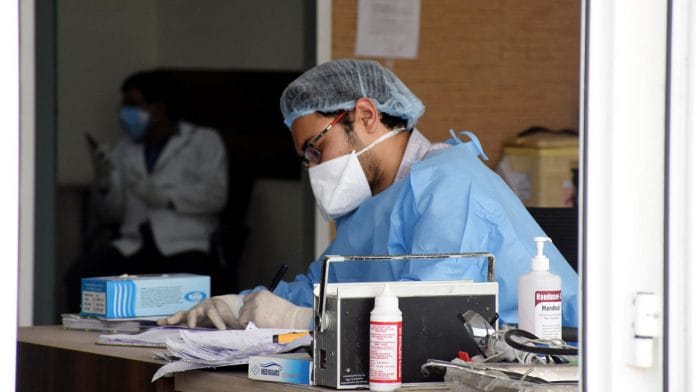New Delhi: Private doctors who, during COVID-19, ran establishments and clinics will fall under the central government’s medical insurance scheme if they succumbed to the infection, irrespective of whether they treated an infected patient, the Supreme Court observed Tuesday.
A bench of justices P.S. Narasimha and R. Mahadevan dismissed the distinction between government doctors and private doctors—as claimed by the Maharashtra government—under the insurance scheme.
“Once two conditions—that the doctor opened his/her clinic during the pandemic and died due to COVID-19—are satisfied, it is not for us to consider whether the doctor opened [the clinic] for providing services for COVID-19 treatment,” the bench said orally. “There should be evidence to support the two conditions.”
The bench, however, has reserved its judgment to prescribe broad guidelines for the implementation of the insurance scheme.
The Union Ministry of Health and Family Welfare announced the insurance scheme for health workers who died of COVID-19 on 28 March 2020.
Titled “Pradhan Mantri Garib Kalyan Yojana Package: Insurance Scheme for Health workers fighting COVID-19”, it assured Rs 50 lakh to the kin of eligible health workers who lost their lives due to COVID-19 while on official duty.
“You should compel the insurance company to pay if, according to you, the condition is met that they were on a COVID-19 response, and they died because of COVID-19. Merely because they were not on government duty, the assumption that they were making profits and sitting idle is not correct,” the bench told additional solicitor general Aishwarya Bhatti, who argued that unless an order to requisition or draft a doctor during the pandemic was in place, the doctor would not be eligible under the PM insurance scheme.
The petition the SC was hearing challenges the Bombay High Court’s 2021 judgment that directed the exclusion of private doctors—not requisitioned by a government order at the time to work as frontline workers—from the scheme.
Also Read: SC refuses 2 weeks for Delhi Police response to bail for 2020 riots conspiracy accused, gives 3 days
The petition
The petition was filed by the wife of a private doctor who continued to operate his clinic during the pandemic on the Maharashtra government’s directions.
The doctor died in June 2020, and the cause of his death was attributed to COVID-19. Claiming to be a beneficiary, the wife applied to the state government for the insurance money, as promised under the scheme.
The state, however, rejected her claim, contending that her husband ran a private practice and that his dispensary was not recognised as a COVID-19 unit. It was also argued that the doctor was never requisitioned by the state government for his services.
Before the HC, the petitioner argued that on 14 March 2020, the Maharashtra government framed COVID-19 regulations, one of which—Regulation 10—empowered the municipal commissioner to requisition the services of any person, if required.
Subsequently, the Centre declared its insurance scheme on 28 March 2020 and, thereafter, within three days, the Navi Mumbai Municipal Corporation Commissioner issued a notice on 31 March, directing the petitioner’s husband and other doctors in the city to keep their establishments open during the lockdown.
In her appeal before the SC, the petitioner argued the commissioner’s directive from 31 March was pursuant to COVID-19 regulations. Though it did not particularly use the word “requisition”, the import of the order had features of requisitioning.
The language and content of the notice were obligatory. Non-compliance would have attracted criminal prosecution, said her appeal against the discriminatory HC order. Her appeal was against the order distinguishing between a government health worker and a private one.
‘Can’t be distinguished’
Similarly situated families later joined the petition.
The Indian Medical Association also filed an intervention in the case, opposing the HC’s opinion. The IMA said health workers who served on the frontlines during the pandemic cannot be segregated into two categories.
What HC did was impermissible—it carved out a separate segment of doctors to deny some of them the insurance cover policy benefits. The IMA termed it as a non-existing difference, resulting in over-classification, which is not permissible under the Constitution.
During the Tuesday hearing, IMA counsel Prabhash Bajaj told the court that the COVID-19 virus does not discriminate between doctors. Health workers in the private and public sectors were basically the same. To create a class among doctors based on their employment would be unfair, he said.
“Society will not forgive us if we do not take care of our doctors,” the bench said Tuesday.
“That the said doctor volunteered to offer his medical services by keeping his clinic or hospital open for patients to consult him must be proved by way of some credible evidence,” Justice Narasimha further observed.
“There must also be proof that the doctor passed away because of being infected with COVID-19. Once these two questions are satisfied, it is not for us to question as to whether the doctor has opened his clinic or offered his services for COVID-19 alone,” he explained.
He also asked Bhatti to provide the relevant data and information about any other insurance schemes, pertaining to health workers.
(Edited by Madhurita Goswami)






